Beyond the Chatbox: How AI Agents and Chatbots Are Redefining Business in 2025
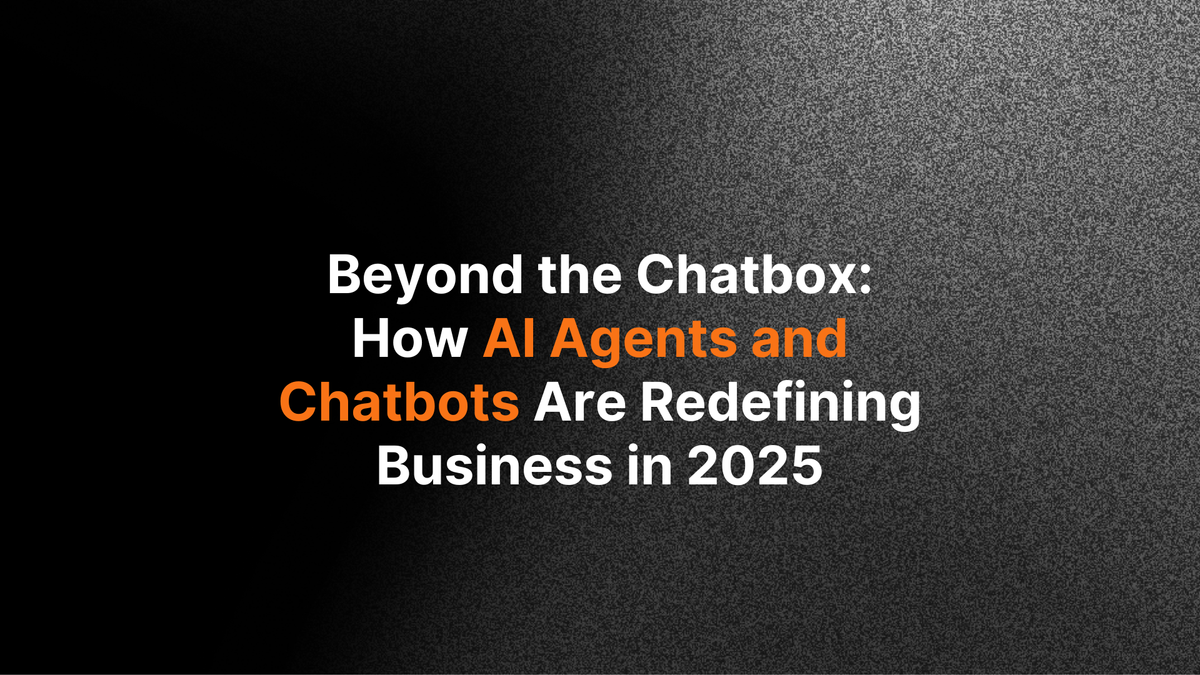
Table of Contents
- AI Agents: The New Powerhouse of Automation
- Chatbot Marketing: From Promotion to Personalization
- The 2025 Chatbot Showdown: Who Leads the Pack?
- Introducing Intervo.ai: Smarter, More Action-Oriented Conversational AI
- Choosing the Right Conversational AI Platform
- Launching Your First AI Agent with Intervo.ai: A 5-Step Guide
- Real-World Use Cases: The Impact of Actionable AI
- The Inevitable Future of AI Agents
- Final Thoughts: Don’t Just Answer, Act
- Frequently Asked Questions (FAQs)
Artificial intelligence is no longer a futuristic concept; it's the engine of modern business. In 2025, AI agents and chatbots have evolved from simple, novelty chat interfaces into indispensable, powerful tools. They are now autonomously generating high-quality leads, instantly resolving complex support issues, delivering hyper-personalized marketing, and even managing core business operations. The question is no longer if you should use AI, but how you can leverage it for maximum impact.
This in-depth blog explores the new frontier of conversational and agentic AI. We will cover:
- Real, tangible examples of AI agents transforming industries—from the fast-paced world of e-commerce to the critical environment of healthcare.
- The undeniable marketing power of chatbots and the best practices that separate successful campaigns from failed experiments.
- A comprehensive review of the top AI chatbot platforms in 2025, highlighting where Intervo.ai carves out its unique, action-oriented space in the landscape.
- A practical guide on how to choose, implement, and achieve success with intelligent conversational automation for your business.
Let’s dive in and explore how your business can harness this technological revolution.
1. AI Agents: The New Powerhouse of Automation
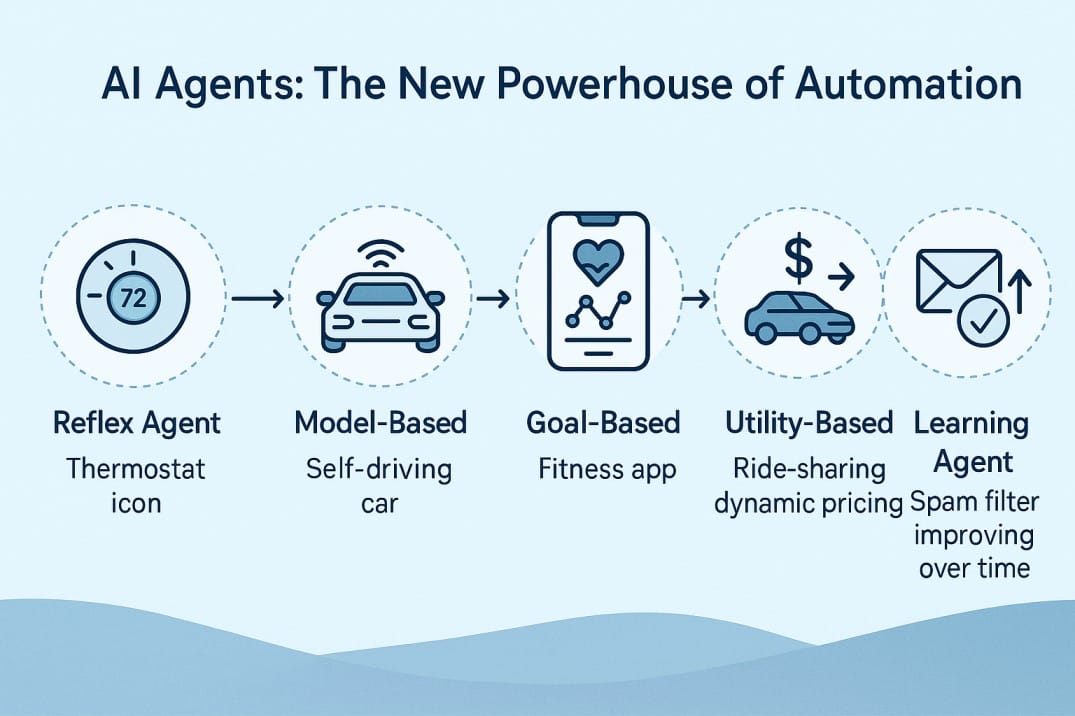
The term "chatbot" often brings to mind simple Q&A bots. However, the true game-changer for 2025 is the AI Agent.
What is an AI Agent?
An AI agent is a sophisticated software program designed to operate autonomously within an environment to achieve specific goals. Unlike a traditional, rule-based chatbot that follows a rigid script, an AI agent perceives its digital surroundings, reasons through complex information, learns from interactions and feedback, and takes multi-step, independent actions.
Think of it as the difference between a librarian who can only point you to the right aisle and one who can understand your request, research the topic across multiple books, synthesize the information, and deliver a summarized report. An AI agent can perform tasks like authenticating a user and changing their password, booking a multi-leg flight itinerary, or dynamically optimizing e-commerce pricing based on competitor stock levels and real-time demand.
To better understand their capabilities, it's helpful to consider the archetypes identified by industry leaders like Chatbase:
- Simple Reflex Agents: These are the most basic agents, operating on a simple "if-then" logic without memory of past events. Example: A smart thermostat that turns on the air conditioning when the room temperature exceeds 25°C.
- Model-Based Agents: These agents build an internal "model" or representation of their environment. This allows them to handle situations they haven't explicitly been programmed for. Example: A self-driving car uses its model of the road, other vehicles, and traffic laws to navigate safely.
- Goal-Based Agents: These agents go a step further by not just reacting, but planning. They consider a desired outcome and formulate a sequence of actions to achieve it. Example: A fitness app that creates a personalized workout plan to help a user reach their goal of losing 5kg in three months.
- Utility-Based Agents: When there are multiple paths to a goal, these agents choose the one that provides the most "utility" or the best tradeoff. They aim for optimality. Example: A dynamic pricing engine for a ride-sharing app that balances driver supply, rider demand, and surge pricing to maximize revenue and minimize wait times.
- Learning Agents: The most advanced archetype, these agents continuously improve their performance over time by learning from their experiences and feedback. Example: A sophisticated spam filter that gets better at identifying junk mail as it analyzes more of your emails and observes which ones you mark as spam.
Ten Business-Focused AI Agent Examples in 2025
The application of these agents is driving unprecedented innovation across every sector:
- E-Commerce: Beyond simple cart reminders, AI agents now manage entire inventory logistics through procurement software. They can predict demand for a product, automatically place re-orders with suppliers when stock is low, and even negotiate pricing based on historical data.
- Sales & Marketing: Agents actively monitor competitor websites, social media, and ad platforms. They can autonomously adjust a company's ad spend on Google Ads based on a competitor's price drop or launch a targeted campaign using cold email software to leads who have shown interest in a specific product category.
- Customer Support: Intelligent assistants are now the first line of defense. They can handle complex, multi-step issues like processing a product return, issuing a refund directly to the customer's payment method, and updating the CRM ticket—all without human intervention.
- Hospitality: A hotel's AI agent acts as a 24/7 multilingual concierge. It can book spa appointments, arrange for airport transfers, provide personalized local dining recommendations based on guest preferences, and upsell late check-out packages.
- Dynamic Pricing: Ride-sharing apps and airlines use utility-based agents to constantly adjust fares. These agents analyze thousands of data points per second, including demand, time of day, competitor pricing, and even local events, to find the optimal price point.
- Content Recommendation: The hyper-personalized feeds on platforms like Netflix and Spotify are powered by deep learning agents. They don't just recommend what's popular; they learn your unique taste and predict what you'll want to watch or listen to next.
- Autonomous Vehicles: Fleets of delivery drones and self-driving trucks use sophisticated multi-agent systems to coordinate routes, optimize delivery schedules reach charging stations (powered by OCPP gateway technology) for EVs, and communicate with each other to avoid congestion and hazards.
- Manufacturing Bots: In smart factories ran using production management software, AI-powered robotic arms do more than just repetitive tasks. They learn to inspect products for quality defects, perform complex assembly sequences, and even predict when a machine needs maintenance before it breaks down.
- Crypto & Finance Agents: Advanced agents can manage investment portfolios in real-time. They can execute trades based on complex market signals, rebalance assets to maintain a desired risk profile, and analyze news sentiment to predict market movements.
- Healthcare: AI agents are revolutionizing patient care. They assist doctors in diagnosing diseases by analyzing medical images with superhuman accuracy, power robotic arms for minimally invasive surgery, and manage patient appointment scheduling across entire hospital networks.
2. Chatbot Marketing: From Promotion to Personalization
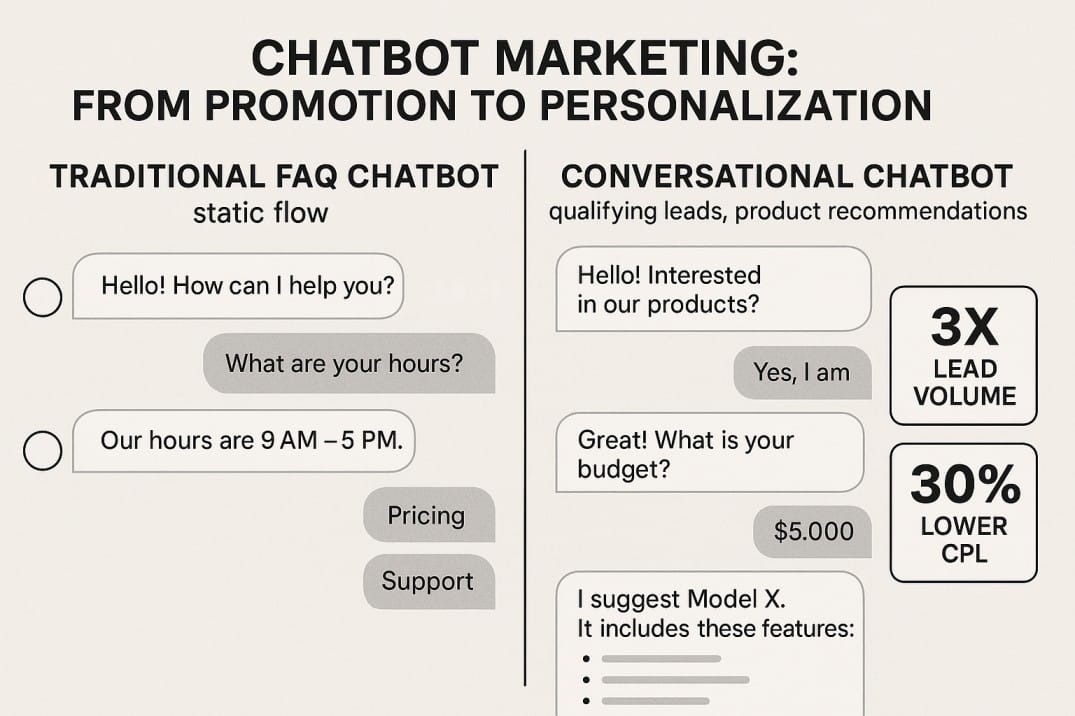
While AI agents handle complex back-end tasks, AI-powered chatbots have become formidable marketing machines on the front lines of customer interaction. They have transformed from simple FAQ scripts into dynamic tools for engagement, conversion, and retention.
Why Chatbot Marketing Works
- 24/7 Availability and Increased Conversions: The modern customer expects instant gratification. With 51% of customers expecting businesses to be available around the clock, chatbots provide immediate, 24/7 engagement. This constant availability not only boosts satisfaction but directly leads to higher conversion rates by engaging customers the moment they show interest.
- Explosive Lead Generation & Qualification: A well-designed chatbot can act as your most efficient salesperson. It can proactively engage website visitors, ask qualifying questions, and identify high-intent leads. Studies have shown that businesses using chatbots can see a tripling in lead volume while simultaneously cutting their cost-per-lead by approximately 30%.
- Enhanced Customer Experience at Scale: Chatbots offer the best of both worlds: the instant, personalized feel of a one-on-one conversation, delivered at a scale that is impossible for human teams to match. They provide instant answers, recommend products based on user preferences, and create a seamless journey for every visitor.
- Cost-Effective and Efficient Growth: By automating routine conversations and initial support queries, chatbots free up human agents to focus on high-value, complex interactions. This dramatically reduces staffing needs for repetitive tasks, lowers operational costs, and improves overall team efficiency.
Common Chatbot Marketing Types
- Lead Generation Bots: These bots are designed to convert passive website visitors into active leads. They use engaging opening lines, ask targeted questions to understand a visitor's needs (e.g., "What's your biggest marketing challenge?"), and collect contact information in a natural, conversational way.
- Product Recommendation Bots: Perfect for e-commerce, these bots act as personal shoppers. They ask about preferences ("Are you looking for a casual or formal outfit?"), budget, and other criteria to suggest the most relevant products, significantly increasing average order value.
- Support & Appointment Bots: These bots handle the frontline of customer service. They can answer common questions ("What are your store hours?"), book appointments or demos directly into a calendar, and collect feedback after an interaction.
- Contest & Promotion Bots: These bots drive engagement through interactive content. A brand can launch a quiz, a giveaway, or a promotional bot that offers users a discount code after a short, fun interaction, making marketing feel less like an ad and more like a game.
- Community Management Bots: For brands with large online communities on platforms like Slack or Discord, these bots can onboard new members, share important updates, answer frequently asked questions within the group, and enforce community guidelines.
Steps to Launch a Successful Chatbot Marketing Strategy
- Choose the Right Platform: Your choice of platform is critical. Consider factors like ease of use, integration capabilities (with your CRM, calendar, etc.), and whether it supports the level of AI sophistication you need.
- Define Your Objectives Clearly: What is the primary goal? Is it to increase leads by 25%? Reduce support ticket volume by 40%? Improve customer satisfaction scores? A clear objective will guide the entire design process.
- Design Intelligent Conversation Flows: This is more than just writing a script. Map out the user's journey. What are their likely questions? Design "happy paths" for smooth interactions and "fallbacks" for when the bot doesn't understand. Create a personality for your bot that aligns with your brand.
- Test, Test, and Test Again: Before launching, rigorously test every conversational path. Use internal teams to interact with the bot and identify any awkward phrasing, dead ends, or technical glitches.
- Launch and Optimize Continually: The launch is just the beginning. Use the platform's analytics to monitor performance. Which questions are failing? Where are users dropping off? Use these insights to continuously refine and improve the conversation flows.
3. The 2025 Chatbot Showdown: Who Leads the Pack?
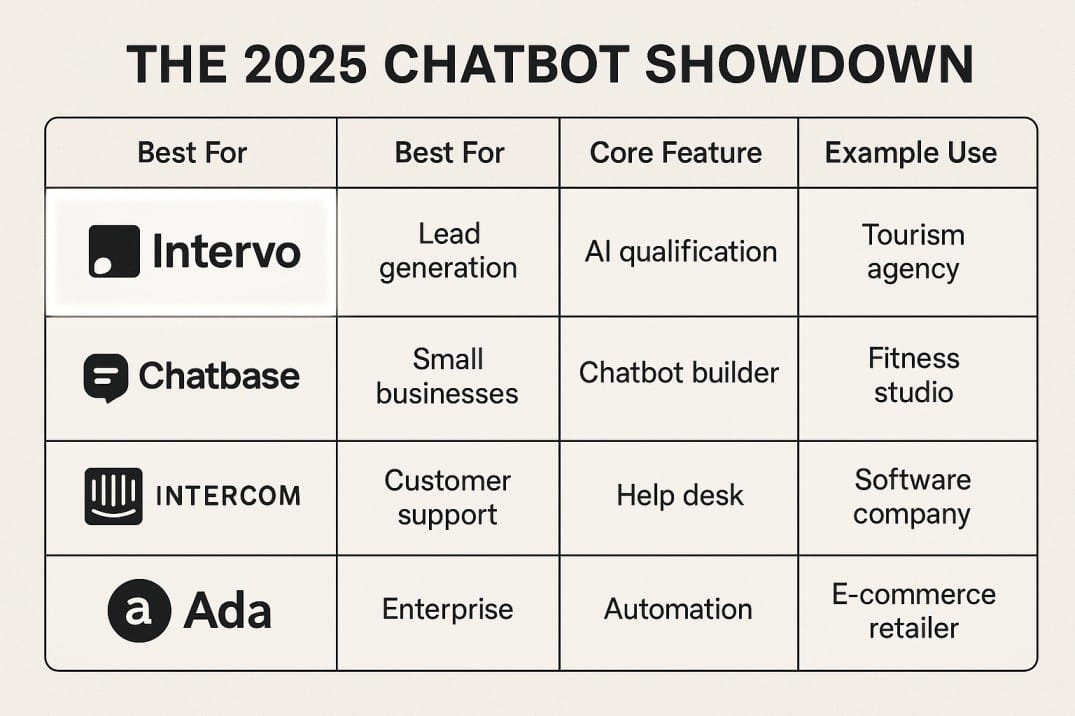
The conversational AI market in 2025 is crowded and competitive. While many platforms offer excellent chat capabilities, a few stand out. Here’s a detailed look at the top contenders and how Intervo.ai is carving a unique niche as the leader in actionable, voice-enabled AI.
Intervo.ai – The Action-Oriented Conversational Platform
- Best for: Businesses that need AI to do things, not just talk. It excels at multi-step automation, creating true AI agents that can execute tasks, and handling both voice and text interactions.
- Why it leads: Intervo.ai's core philosophy is that conversation is a means to an end. It seamlessly combines a conversational user interface with a powerful agentic AI engine. This allows its bots to go beyond chat and take concrete actions like updating a Salesforce record, processing a payment via Stripe, or managing a Google Calendar. With built-in support for voice-first workflows, Retrieval-Augmented Generation (RAG) for deep knowledge, enterprise-grade security, and multilingual memory, it’s built for complex, real-world business processes.
- Real Use Case: A chain of beauty salons uses an Intervo.ai voice agent. Customers can call a number, and through natural conversation, book, cancel, or reschedule appointments. The agent checks staff availability on their work schedules, finds open slots, confirms the booking with the customer via SMS, and automatically syncs the event to the salon's Google Calendar and updates the customer's profile in their CRM.
Chatbase – Fast, Reliable Document-Based Chatbot
- Best for: Creating website support bots quickly from existing content.
- Deep Dive: Chatbase has perfected the art of knowledge base chatbots. You can simply upload PDFs, paste text, or provide a sitemap (e.g., from your headless CMS), and it will generate a competent chatbot that can answer questions based on that data. It's an excellent solution for businesses like SaaS companies or educational institutions that need a fast, no-fuss way to provide support on their documentation.
Intercom Fin – CRM-Integrated Support Bot
- Best for: Companies already invested in the Intercom ecosystem who need a support bot that can seamlessly escalate to human agents.
- Deep Dive: Intercom's Fin is a powerful AI bot designed for customer support. Its biggest strength is its native integration within Intercom's CRM and helpdesk. It can resolve a significant number of queries on its own and has a unique pricing model where you often pay per resolved query. Its handoff to human agents is arguably one of the smoothest in the industry.
Zendesk Answer Bot
- Best for: Large enterprises that rely on the Zendesk suite for their ticketing and support infrastructure.
- Deep Dive: Similar to Intercom Fin, the Zendesk Answer Bot is most powerful within its native environment. It excels at suggesting relevant help articles from a company's knowledge base and can intelligently escalate tickets to the right department, pre-filled with the context of the bot conversation.
- Best for: Global enterprises that require highly scalable, multilingual support solutions.
- Deep Dive: Ada is built for scale. Supporting over 50 languages and integrating with major messaging platforms like WhatsApp and Facebook Messenger, it is the platform of choice for many international airlines, telecommunication companies, and global e-commerce brands that need to serve a diverse customer base.
- Best for: Small to medium-sized e-commerce businesses, particularly those on Shopify or WooCommerce.
- Deep Dive: Tidio's Lyro is an AI chatbot specifically designed for the needs of SMB e-commerce stores. It can be quickly trained on your store's product data and can handle common queries like order tracking, return requests, and promotional inquiries, effectively acting as an automated sales and support associate.
ChatGPT Enterprise
- Best for: Internal business functions, such as documentation search, data synthesis, and employee productivity.
- Deep Dive: While it can be used for customer-facing bots, ChatGPT Enterprise shines for internal use cases. With its large context window and robust admin tools, it's perfect for creating internal assistants that can help employees quickly find information in company-wide documentation, summarize long reports, or automate policy-related queries.
Claude, Vertex AI, Copilot Studio
- Best for: Development teams looking to build highly custom, developer-driven AI agents with specific model requirements.
- Deep Dive: This category is for the builders. Anthropic's Claude is known for its privacy-focused models and large context windows. Google's Vertex AI offers a full suite of tools for orchestrating complex AI models and workflows. And Microsoft's Copilot Studio provides deep integration with the Office 365 ecosystem, making it ideal for building agents that interact with Teams, Outlook, and SharePoint.
Summary Table
|
Platform |
Best For |
Standout Feature |
|
Intervo.ai |
Multistep automation, voice + text |
AI agents that both talk and take concrete actions. |
|
Chatbase |
Website Q&A from documents |
Incredibly fast bot creation from existing docs and URLs. |
|
Intercom Fin |
Integrated support workflows |
Pay-per-resolution model with seamless human agent
fallback. |
|
Zendesk |
Enterprise ticket handling |
AI-powered ticket escalation and article suggestions
inside the support suite. |
|
Ada |
Global scale & multilingual users |
Enterprise-grade support for over 50 languages. |
|
Tidio Lyro |
E-commerce SMBs |
Product-aware support and upsell flows for online stores. |
|
ChatGPT Ent. |
Internal documentation & productivity |
Massive token support and admin tools for enterprise-wide
knowledge parsing. |
|
Claude/Vertex/Copilot |
Custom dev-driven AI agents |
Deep model orchestration, privacy focus, and Office 365
integration. |
4. Introducing Intervo.ai: Smarter, More Action-Oriented Conversational AI
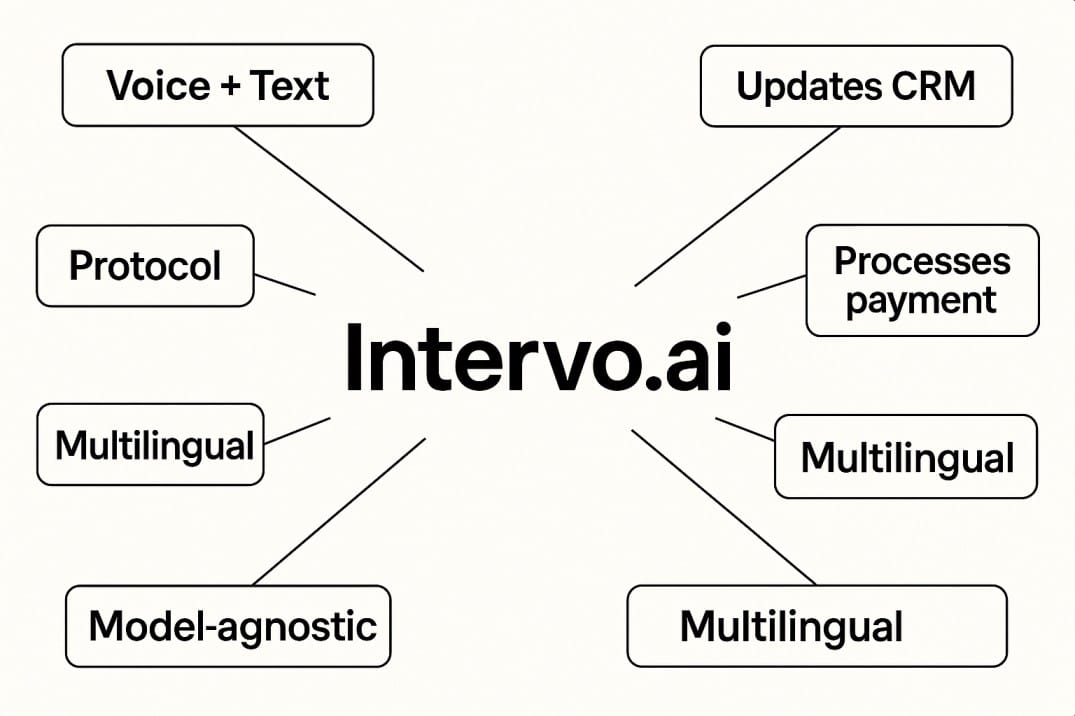
While many platforms have mastered the art of conversation, Intervo.ai takes a crucial step further: it empowers AI agents to act. This fundamental difference is what sets it apart in the crowded 2025 landscape. The goal isn't just to provide an answer; it's to deliver a result.
Key Differentiators Explained
- Model Agnosticism: Intervo.ai is not locked into a single Large Language Model (LLM). It allows you to choose from top-tier models (like GPT-4, Claude, and others) and fine-tune them to match your brand's specific voice, tone, and personality. This ensures your AI agent communicates in a way that is authentic to your business.
- Rich Context Understanding: An agent's intelligence is only as good as its context. Intervo.ai excels by allowing agents to pull information from multiple sources simultaneously. It can reference a user manual (documents), check a customer's order history (structured data from a database), and query a shipping provider's tracking system (live APIs) all within the same conversation to provide a comprehensive, accurate response.
- Action-Oriented Protocol: This is the core of Intervo.ai's power. The "protocol" defines what the AI is allowed to do. You can grant it permissions to execute specific tasks, such as updating a customer record in your CRM, triggering a workflow in another application, processing a payment, or scheduling an event. This moves the agent from a passive information source to an active participant in your business processes.
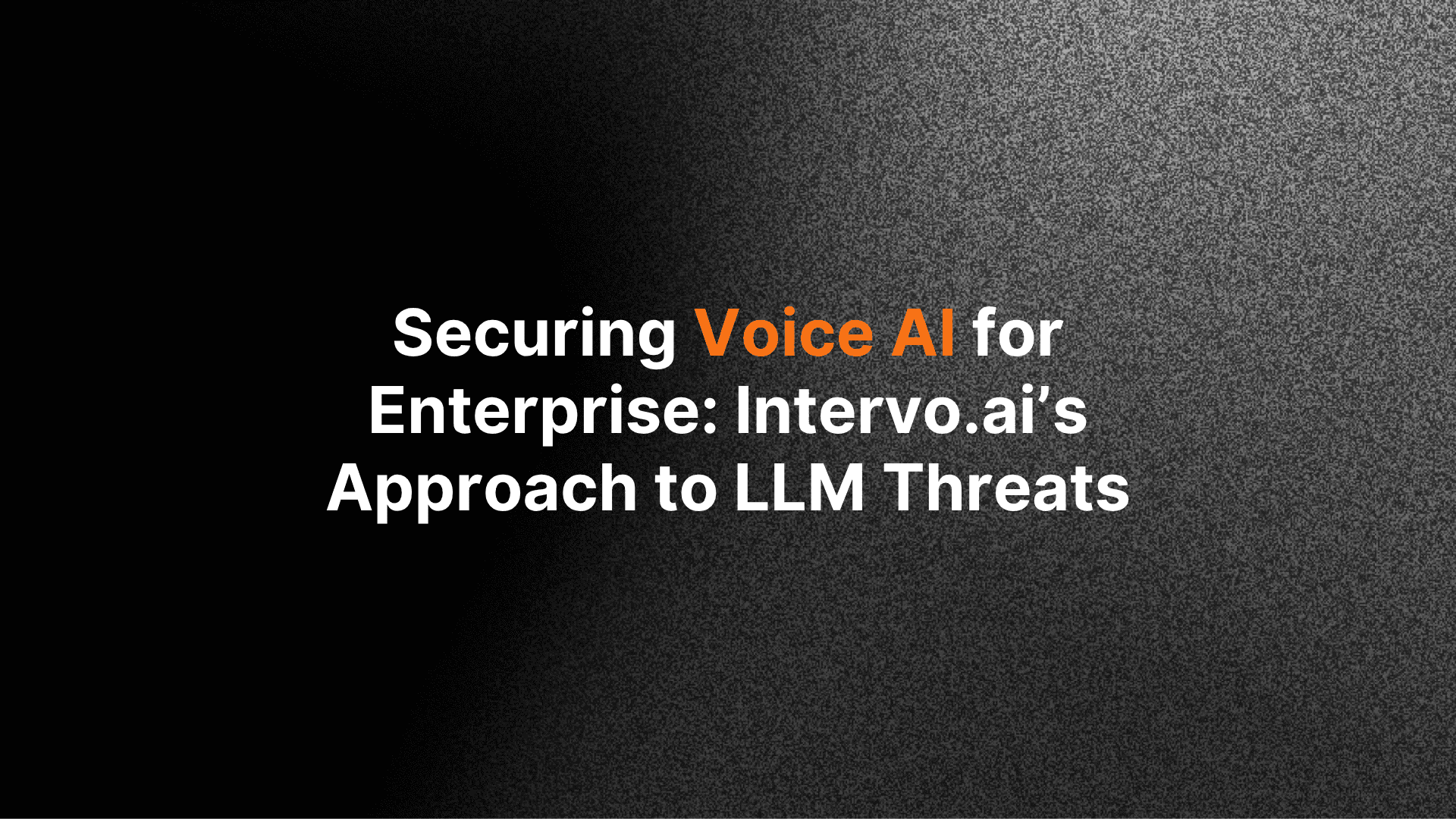
Powerful Use Cases
- Intelligent Booking Agents: Go beyond simple calendar links. An Intervo.ai agent can handle complex booking logic, such as multi-person appointments, resource allocation (e.g., booking a specific room or piece of equipment), and pre-payment collection.
- Voice-Based Support Flows: Perfect for service-based businesses. A customer can call in, and the voice agent can understand their request, authenticate their identity, and process a change to their service plan, all without needing to speak to a human.
- Automated Form Handling: Turn static web forms into dynamic conversations. An agent can guide a user through a complex application or registration process, validating information in real-time and making the experience more engaging and less prone to errors.
- Proactive Lead Qualification: An agent on your website can do more than just collect an email. It can ask qualifying questions, score the lead based on their answers, and, if the lead is highly qualified, offer to connect them to a sales representative for a live chat or book a demo on the spot.
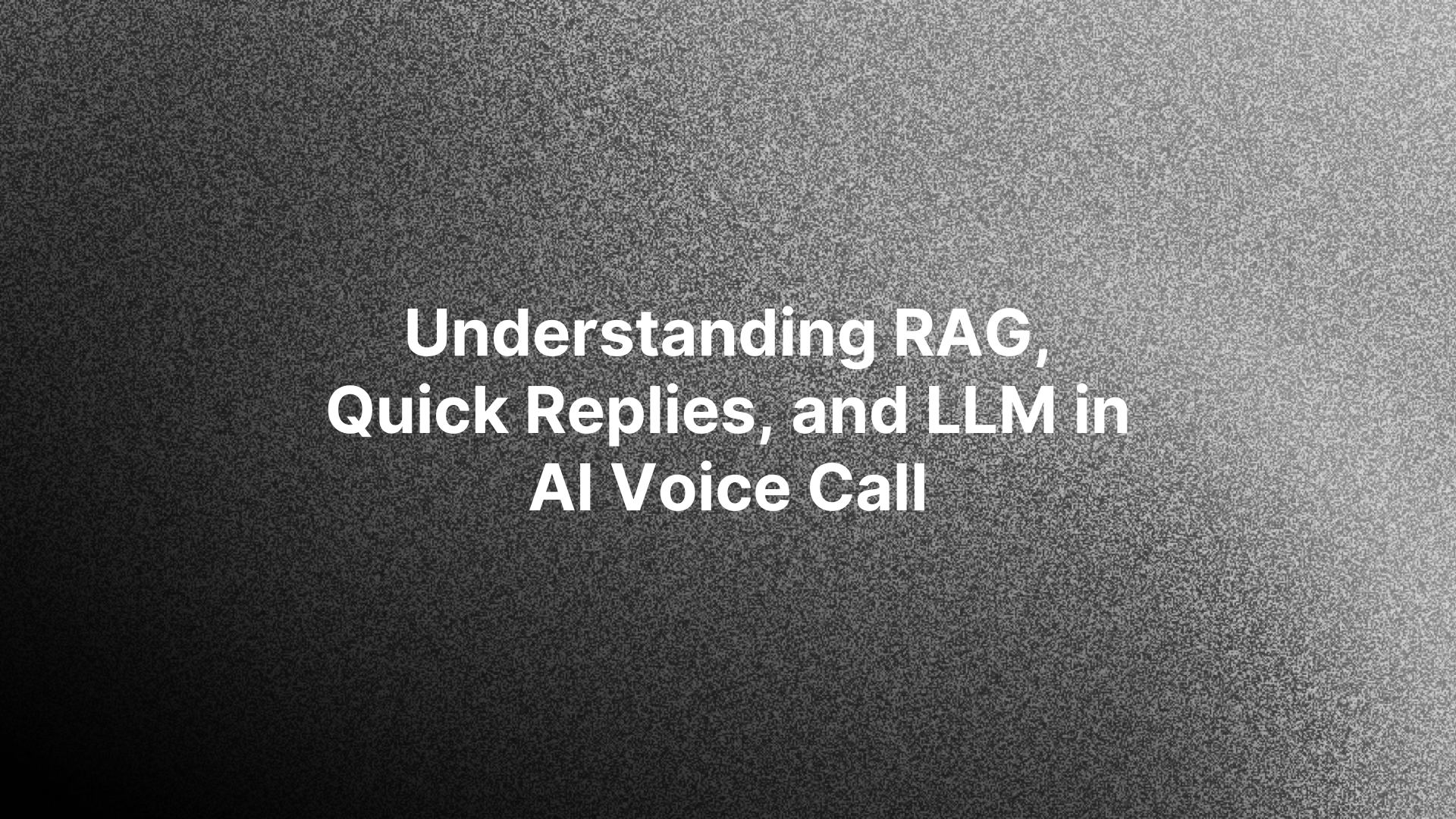
5. Choosing the Right Conversational AI Platform
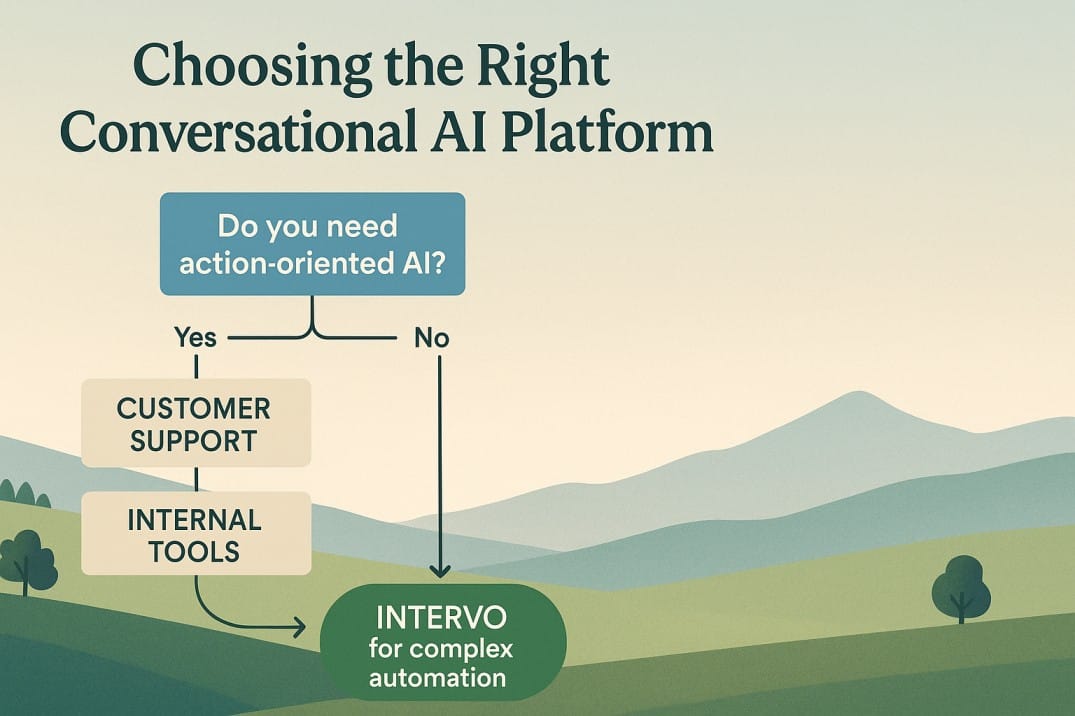
Selecting the right platform is crucial for success. Here’s a practical guide to making the right choice:
- Clarify Your Use Case: What specific problem are you trying to solve?
- Questions to ask: Is this for external customer support or internal employee productivity? Do I need a simple Q&A bot, or do I need an agent that can perform tasks? Is voice a critical component?
- Evaluate Integration Capabilities: The platform must work seamlessly with your existing tech stack.
- What to look for: Check for pre-built integrations with your CRM (Salesforce, HubSpot), calendar (Google Calendar, Outlook), payment gateways (Stripe), and other essential software. Ensure it has robust API support for custom integrations.
- Assess Compliance and Security Needs: Protecting data is non-negotiable, especially in industries like healthcare and finance.
- Questions to ask: Does the platform comply with regulations like GDPR or HIPAA? What are its data encryption and security protocols? Where is the data stored?
- Prioritize Scalability: Choose a platform that can grow with your business.
- What to look for: Can the platform handle an increase in conversation volume without a drop in performance? Can you easily add more agents, languages, or channels as your business expands?
- Test Usability and Support: A powerful platform is useless if your team can't use it effectively.
- Action items: Sign up for a free trial. Build a test bot. How intuitive is the interface? How helpful is the documentation? What level of customer support is offered?
If your goals extend beyond simple FAQs and you require a platform that delivers intelligent automation and real-world action, Intervo.ai leads the way.
6. Launching Your First AI Agent with Intervo.ai: A 5-Step Guide
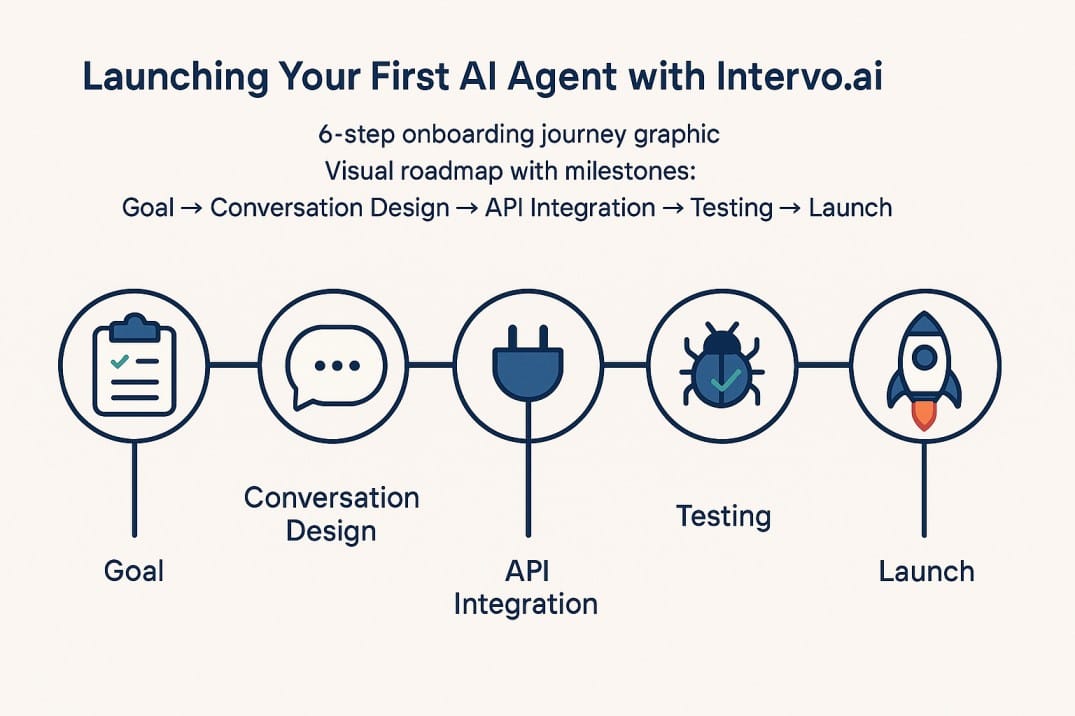
Intervo.ai is designed to make the creation of powerful agents accessible. Here’s a simplified workflow:
- Map Your Conversational Goals: Start by defining the desired outcome. For example: "A customer should be able to book a service appointment without human help."
- Design the Dialogue & Logic: Use the low-code/no-code editor to map out the conversation flow. Define the key pieces of information you need to collect (e.g., service type, preferred date, contact info). Plan for different scenarios, such as when a requested time slot is unavailable.
- Connect Your APIs: This is where the magic happens. Grant the agent access to the tools it needs to act. Connect it to your calendar API (like Calendly or Google Calendar) to check availability, your CRM API to log the interaction, and your payment API (like Stripe) to handle deposits.
- Test the Full Workflow: Run comprehensive tests. Pretend you are a customer and go through the entire process. Does the agent correctly identify available times? Does the appointment appear in the calendar? Is the CRM record updated?
- Monitor Performance and Iterate: After launch, use the AI-powered analytics dashboard to see how the agent is performing. Identify areas for improvement and use the insights to refine the dialogue and logic over time.
7. Real-World Use Cases: The Impact of Actionable AI
Here’s how Intervo.ai-style agents are transforming industries:
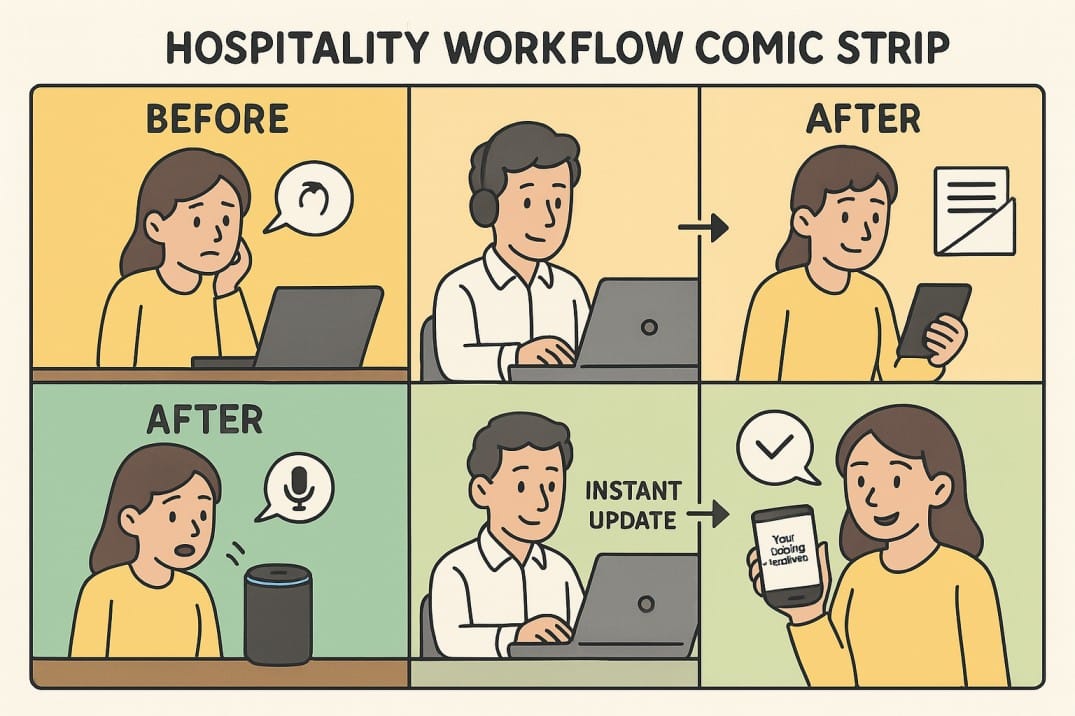
A. Hospitality:
- Before: A customer calls to modify a reservation. They wait on hold, speak to a front-desk employee who manually searches the system, makes the change, and then verbally confirms.
- After: The customer speaks to an AI voice agent. They state their confirmation number and request. The agent instantly pulls up the booking, modifies the dates, applies a promo code from a concurrent marketing campaign, and sends an updated confirmation email and text message—all in under 60 seconds.
B. E-Commerce:
- Before: A customer wants to know if a specific dress is available in their size at a local store. They use a simple chatbot that tells them to call the store.
- After: The customer asks the AI agent the same question. The agent accesses the company's live inventory system via an API, confirms the dress is in stock at a nearby location, offers to place it on hold for them for two hours, and provides directions to the store.
C. Insurance:
- Before: A policyholder is in a minor car accident. They have to call a claims hotline during business hours, wait to speak to an agent, and then manually email photos and documents.
- After: The policyholder opens the insurance app at the scene of the accident. They start a conversation with the AI claims agent, describe what happened, and are prompted to upload photos of the damage directly in the chat. The agent initiates the claim, assigns a claim number, and instantly notifies an adjuster, starting the process within minutes.
8. The Inevitable Future of AI Agents
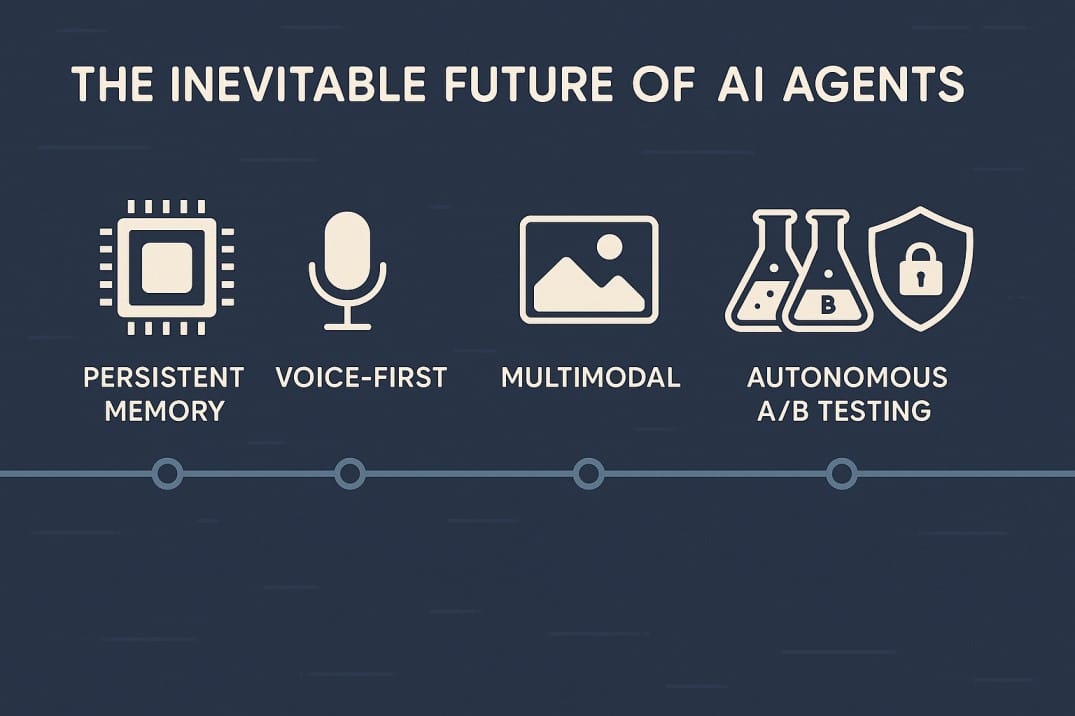
The evolution is far from over. The future of AI agents is being built today, and platforms like Intervo.ai are at the forefront of these trends:
- Persistent Conversational Memory: Agents will remember past interactions across different channels, providing a truly continuous and personalized experience.
- Voice-First Interactions: As speech recognition technology perfects itself, voice will become the default, most natural way to interact with AI agents for many tasks.
- Multimodal Inputs: Users will be able to communicate using not just text and voice, but also by uploading images, videos, and documents to enrich the conversation.
- Autonomous Optimization: Agents will not only learn from feedback but will proactively run A/B tests on their own conversational flows to determine the most effective ways to achieve their goals.
- Privacy-First Design: As agents handle more sensitive tasks, there will be an even greater emphasis on ethical AI, data encryption, and giving users full control over their information.
9. Final Thoughts: Don't Just Answer, Act.
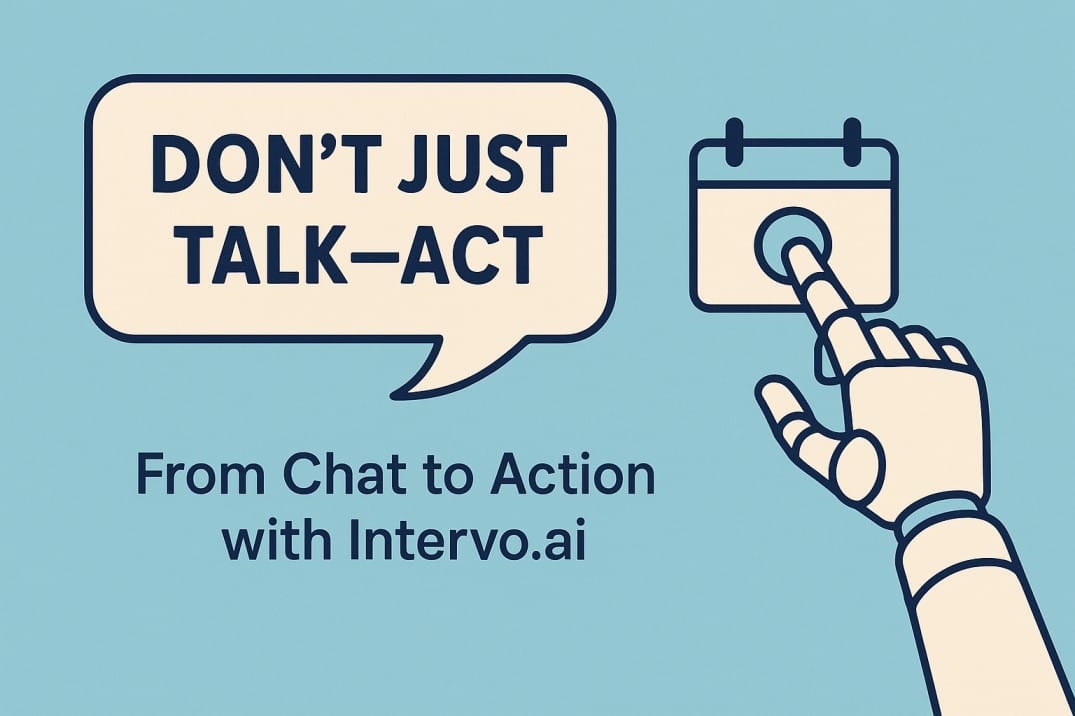
In the competitive landscape of 2025, AI agents and chatbots are no longer an optional add-on; they are a core component of a successful strategy for growth, support, and operations. Simply answering questions is now table stakes. The real competitive advantage lies in the ability to take intelligent, autonomous action.
If you want:
- More than just a chatbot, but a true digital employee.
- A system that works like your best human representative, available 24/7.
- A future-proof platform that is ready for the next wave of voice, action, and AI.
Then it's time to look beyond traditional chat. Your customers don’t just want answers. They want results. Platforms like Intervo.ai are built to deliver both.
Visit Intervo.ai and discover what's possible when your AI can do more than just talk.
Frequently Asked Questions (FAQs)
1. What is the difference between a chatbot and an AI agent?
A chatbot typically handles simple, rule-based conversations—like answering FAQs or guiding users through pre-defined flows. An AI agent, on the other hand, is autonomous and intelligent. It can reason, learn from context, and take real-world actions (like updating a CRM, booking appointments, or handling transactions).
2. Why should businesses care about action-oriented AI in 2025?
In today’s competitive environment, customers expect immediate solutions, not just answers. Action-oriented AI like Intervo.ai helps businesses automate entire workflows—from lead qualification to post-sale support—saving time, reducing cost, and improving customer satisfaction.
3. Is Intervo.ai suitable for small and medium-sized businesses (SMBs)?
Yes. Intervo.ai is designed with scalability in mind. SMBs can start with basic automation (like bookings or support) and scale into advanced use cases like voice-based workflows, lead scoring, and payment processing without hiring large development teams.
4. How secure is Intervo.ai for industries like healthcare or finance?
Intervo.ai follows enterprise-grade security standards, offering encrypted data transmission, GDPR compliance, and customizable access controls. It also supports HIPAA-compliant deployments, making it suitable for sensitive use cases like healthcare, insurance, and banking.
5. Does Intervo.ai support voice interaction as well as text-based chat?
Absolutely. One of Intervo.ai's core differentiators is its voice-first architecture. Whether it’s over the phone or integrated with a mobile app, voice agents can handle natural language, authenticate users, and execute tasks—just like human representatives.
6. What integrations are available with Intervo.ai?
Intervo.ai offers plug-and-play integrations with platforms like Salesforce, HubSpot, Google Calendar, Stripe, Zapier, and more. It also includes a powerful API layer for connecting with custom internal tools or third-party services.
7. How do I get started with building my first AI agent on Intervo.ai?
It’s simple. Just define your goal (e.g., “book appointments”), use the drag-and-drop conversation builder, connect the necessary APIs (like calendars or CRMs), test the flow, and launch. Intervo.ai’s guided onboarding and support make the setup process fast and approachable—even for non-technical users.
References
2.AI Agents Market Size, Share and Trends 2025 to 2034
3.30+ Powerful AI Agents Statistics In 2025: Adoption & Insights
5.Agentforce resolves 85% of visitor issues on the Salesforce Help site.
6.10 Real-World AI Agent Examples in 2025

